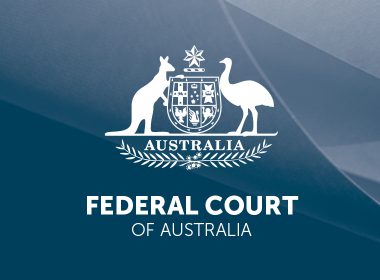Key decision
- Azimitabar v Commonwealth of Australia [2024] FCAFC 52
MIGRATION
Appeal – damages arising from alleged unlawful detention – whether definition impliedly confers power to approve ‘another place’ of immigration detention
Azimitabar v Commonwealth of Australia [2024] FCAFC 52 (‘Azimitabar‘) (Rangiah, Anderson and Button JJ)
The decision of Azimitabar provides some very helpful guidance on the following questions of statutory construction:
- whether a definition contained in an Act can, of itself, confer a decision-making power on a member of the executive branch of Government by implication;
- in what circumstances will the principle of statutory construction in the High Court decision of Anthony Horden & Sons Ltd v Amalgamated Clothing & Allied Trade Unions of Australia (1932) 47 CLR 1 (‘Anthony Horden’) operate to limit the scope of a statutory provision within an Act when there is another legislative provision within that same Act that covers the same subject matter; and
- whether a statutory provision can be rendered inoperative in circumstances where expenditure by the executive branch of the Government is not explicitly authorised by the statutory provision.
Background facts
In July 2013, the appellant, a citizen of Iran, arrived at Christmas Island by boat without a visa. As Christmas Island is defined as an ‘excised offshore place’ under s 5 of the Migration Act 1958 (Cth) (‘Act’), the appellant was deemed an ‘unauthorised maritime arrival’ pursuant to s 5AA of the Act by reason of being present in the migration zone without a valid visa.
The appellant was initially held in detention on Christmas Island and later transferred to a regional processing facility on Manus Island, Papua New Guinea. For the majority of the period between mid-August 2013 and 10 November 2019, the appellant was detained on Manus Island.
In August 2019, the appellant was diagnosed by a psychiatrist with post-traumatic stress disorder. On 11 November 2019, the appellant was brought to Australia for the purposes of psychiatric intervention pursuant to ss 198C and 198B(4)(a) of the Act.
From 11 November 2019 to 16 December 2020, the appellant was detained at the Mantra Bell City Hotel in Presto, Victoria. Later, from 17 December 2020 to 21 January 2021, the appellant was detained at the Park Hotel in Carlton, Victoria. On 21 January 2021, the appellant was granted a bridging visa and was released from immigration detention.
Procedural history
The appellant made an application in the Federal Court of Australia against the Commonwealth for damages asserting that his detention in the hotels was unauthorised by the Act. At first instance, Murphy J dismissed the appellant’s application holding, inter alia, the definition of ‘immigration detention’ contained in s 5(1)(b)(v) of the Act conferred on the Minister, by implication, the power to determine, in writing, another place as an approved place of detention (at [4]).
The appellant brought an appeal in the Full Court of the Federal Court of Australia (‘FCAFC’) and asserted, inter alia, that the primary judge erred in finding that s 5(1)(b)(v) of the Act impliedly conferred on the Minister a power to declare another place, like a hotel, as a place of lawful immigration detention.
Legislative framework
Section 189(1) of the Act provides that if ‘an officer knows or reasonably suspects that a person in the migration zone (other than an excised offshore place) is an unlawful non-citizen, the officer must detain the person’.
Section 273(1) of the Act provides that ‘the Minister may, on behalf of the Commonwealth, cause detention centres to be established and maintained’. Section 273(2) provides that ‘the regulations may make provision in relation to the operation and regulation of detention centres’. Further, s 273(4) provides that, for the purposes of s 273, a ‘detention centre’ means a centre for the detention of persons whose detention is authorised under this Act’.
Section 5(1) states that:
‘detain means:
- take into immigration detention; or
- keep, or cause to be kept, in immigration detention;
and includes taking such action and using such force as are reasonably necessary to do so’.
Finally, s 5(1) defines ‘immigration detention’ to mean:
- ‘being in the company of, and restrained by:
- an officer; or
- in relation to a particular detainee – another person directed by the Secretary or Australian Border Force Commissioner to accompany and restrain the detainee; or
- being held by, or on behalf of, an officer:
- in a detention centre established under this Act; or
- in a prison or remand centre of the Commonwealth, a State or a Territory; or
- in a police station or watch house; or
- in relation to a non – citizen who is prevented, under section 249, from leaving a vessel – on that vessel; or
- in another place approved by the Minister in writing;
but does not include being restrained as described in subsection 245F(8A), or being dealt with under paragraph 245F(9)(b)’.
While there is general acceptance for the proposition that definition sections in acts of Parliament are construed as having no substantive effect, this is merely a principle of drafting and not a substantive principle of law.
Decision on appeal
The FCAFC upheld the findings of the primary judge and dismissed the appeal.
Use of presumptions in interpreting definitions in statute
In the judgment, the FCAFC considered the role of definitions in statutes and the principles of statutory construction that apply to their interpretation. In considering this question, the FCAFC made a number of observations:
- First, while there is general acceptance for the proposition that definition sections in acts of Parliament are construed as having no substantive effect, this is merely a principle of drafting and not a substantive principle of law (at [48] citing Burns Philp & Co Ltd v Murphy (1993) 29 NSWLR 723, 731);
- Second, the general principle of drafting that statutory definitions are merely aids in drafting may be modified by clear legislative intent (at [49] citing Morton Bay Regional Council v Mekpine Pty Ltd (2016) HCA 7 at [61]-[62]);
- Third, in construing statutory provisions the court must have regard to the statutory text, its context (which may include legislative history and extrinsic materials), and the purpose of the provision in the statute (at [52]); and
- Fourth, the principle of statutory construction that a court must strive to give meaning to every word of a statutory provision applies to both the substantive provisions and the definition provisions of a statute (at [52]–[53]).
Having articulated the above principles, the FCAFC held the definition expressed in s 5(1)(b)(v) had to be construed to confer, by implication, a power on the Minister to approve ‘another place’ in ‘writing’ as a place of detention. The FCAFC noted this construction confirms the plain and ordinary meaning of the statutory provision and that failure to uphold it would deny that plain and ordinary meaning and render it ‘otiose’ (at [53]).
The Anthony Horden principle
The FCAFC considered whether the implied power contained in s 5(1)(b)(v) of the Act should be read down in light of s 273(1) of the Act conferring an express power of the Minister to, ‘on behalf of the Commonwealth, cause detention centres to be established and maintained’. Before the FCAFC, the appellant asserted the principle articulated in the High Court decision of Anthony Horden required the FCAFC to read down the implied power conferred by s 5(1)(b)(v) in light of s 273(2). In dismissing the appellant’s submission, the FCAFC directly cited the judgment of Gavan Duffy CJ and Dixon J (as his Honour then was) in Anthony Horden in summarising the relevant principle:
‘when the legislature explicitly gives a power by a particular provision which prescribes the mode in which it shall be exercised and the conditions and the restrictions which must be observed, it excludes the operation of general expressions in the same instrument which might otherwise have been relied upon for the same power’ (at [71] citing Anthony Horden, 7).
In this instance, the FCAFC held there was nothing in the text of s 273(1) of the Act which ‘contained any restriction or limitation on the power of the Minister to establish and maintain a detention centre’ (at [72]) and the section ‘was trained in general terms with no relevant limit on when or how the Minister may establish or maintain the detention centre’ (at [73]). Consequently, there were no limitations upon which the principle articulated in Anthony Hordern could operate so as to read down the statutory power implied in s 5(1)(b)(v) for the Minister to approve of another place of immigration detention in writing. Further, in citing the case of Minister for Immigration and Multicultural and Indigenous Affairs v Nystrom [2006] HCA 50, the Court held there was no repugnancy between the statutory power expressed in s 273(1) and the implied statutory power contained in s 5(1)(b)(v) of the Act and that both powers were cognisant with each other.
Expenditure arguments
Finally, the FCAFC considered whether the implied statutory power contained in s 5(1)(b)(v) of the Act could not have been validly exercised because the expenditure by the Commonwealth for the purposes of using the hotels as other places of detention was not directly authorised by the statutory provisions in the Act. On this question, the FCAFC noted that nowhere in any of the statutory provisions in the Act authorising detention of non-citizens (specifically, s 189(1) and s 5(1) defining the meaning of ‘detain’) is there:
‘any basis to suggest that the legality of an individual’s detention depends upon whether the expenditure involved in establishing or running “another place” approved by the Minister in “writing” is authorised. Nor is there any basis to imply such a requirement’ (at [110]).
Consequently, the FCAFC held that:
‘any lack of authorisation to spend money to ensure the functioning of such a place – should there be a lack – does not rob either Hotel of the property that made it a place of immigration detention, namely authorisation by the Minister in writing’ (at [115]).
The FCAFC did not consider whether s 61 of the Constitution would authorise the expenditure on the operation of the hotels as a place of immigration detention, as it considered determination of that question to be unnecessary for the resolution of the appeal.



